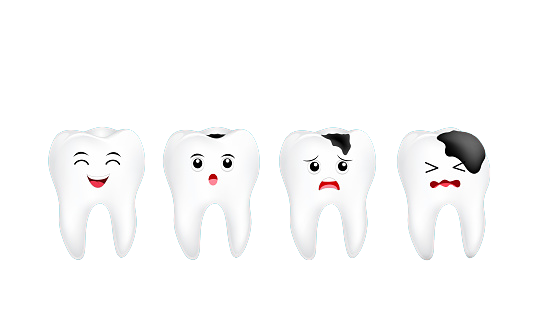A Healthy Diet = Healthy Teeth
Healthy eating habits lead to healthy teeth. Like the rest of the body, the teeth, bones and the soft tissues of the mouth need a well-balanced diet.
Children should eat a variety of foods from the five major food groups. Most snacks that children eat can lead to cavity formation. The more frequently a child snacks, the greater the chance for tooth decay. How long food remains in the mouth also plays a role. For example, hard candy and breath mints stay in the mouth a long time, which cause longer acid attacks on tooth enamel.

If your child must snack, choose nutritious foods such as vegetables, low-fat yogurt, and low-fat cheese which are healthier and better for children’s teeth. Good eating habits that begin in early childhood can go a long way to ensuring a lifetime of good oral health. Good nutrition and a balanced diet will help your child grow up healthy. Whether your child is a toddler or a teen, you can take steps to improve nutrition and encourage smart eating habits.
Kids who take part in regular family meals are more likely to eat fruits, vegetables and grains, less likely to snack on unhealthy foods, and less likely to smoke or drink alcohol. Allow your teens to invite a friend and keep mealtime calm and congenial with no lectures or arguing. Plan around a child who’s at sports practice. Try setting aside time on the weekends such as Sunday brunch, when it may be more convenient to gather as a group.
Younger kids will most likely eat what’s available at home. Work fruits and vegetables into the daily routine. Other good snacks include yogurt, peanut butter and celery or whole-grain crackers and cheese. Serve lean meats and other good sources of protein such as eggs and nuts. Limit fat intake, fast food and other low nutrient snacks. On any given day, one third of toddlers eat no fruit, and French fries are the most commonly consumed vegetable. Instead of sugary drinks such as soda and fruit-flavored drinks, serve water and milk. The carbonation found in soda can actually erode tooth enamel. If they must drink soda, encourage them to use a straw which will help keep at least some of the carbonated beverage away from the teeth.
Children will follow the lead of the adults they see every day. Send the right message. Providing your body with the right amounts of vitamins and minerals helps your teeth, gums and immune system stay strong and wards off infection, decay and disease.
Establish a predictable schedule of meals and snacks. Don’t force kids to clean their plates. Doing so teaches them to override feelings of fullness. Don’t bribe or reward kids with food. Avoid using dessert as the prize for eating the meal. Don’t use food as a way of showing love. Give hugs instead.
Talk to them about making choices and planning a balanced meal. At the store, help your child look at food labels to begin understanding nutritional values. Let them help in the kitchen with age-appropriate tasks. Don’t forget to praise them for jobs well done. Let them help prepare school lunches.

Caries (cavities) are among the most prevalent health problems facing Indian infants, children and adolescents. Frequent ingestion of sugars and other carbohydrates (eg, junk food, juices and acidic beverages) and prolonged contact of these substances with teeth are risk factors in the development of caries. Nutritious conscious parents can prevent cavities for their children by limiting or eliminating apple juice or any other high sugar content juice from their children’s diet. Children at high risk for cavities should restrict their liquid intake to water and milk.
Parents with sports-minded children should limit the use of sugar laden sports drinks. We recommend the use of electrolyte enhanced water.
Along with increasing caries risk, increased consumption of sugar-sweetened beverages and snack foods also has been linked to obesity.

